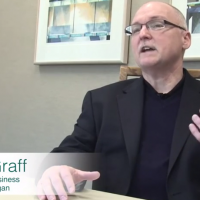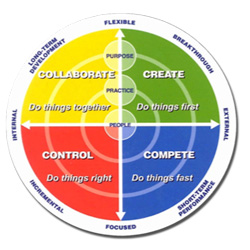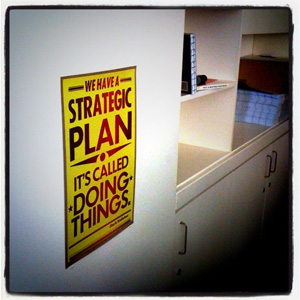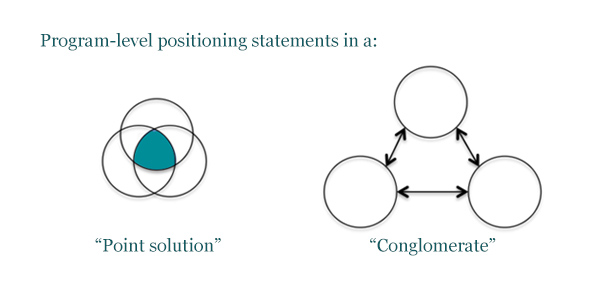This week on Field Notes, we're talking about career paths. We've broken this conversation down into four questions. We'll dive into a different question each day this week. Today, it is all about where you want to be. What is the next thing for you and your career? What do you need in order to get there? How do you know this is right? We often talk about career planning as the act of sitting down to think about our dreams, goals and aspirations, followed by listing off all the things we need to do in order to get there. In this 99u article, … [Read more...]
Constructive Conflict
Jeff DeGraff, a professor at the University of Michigan’s Ross School of Business, expands on the Competing Values Framework, sharing how the creation of constructive conflict allows for internal innovation. How do you see constructive conflict in your own values? Do you see this between your personal values and that of your organization? Tell us in the comments section or at #ValuesNAS. … [Read more...]
A Return to The Competing Values Framework
The Competing Values Framework is one of the best tools that allows organizations to assess their internal culture. You can have each staff or team member share the current and preferred values of the organization, analyzing where “competing values” fall. This exercise gives employees buy-in and provides space for the sharing of organizational and personal core values. Check out our original post on the Competing Values Framework that appeared on Field Notes in December 2012. You can see what we learned by completing the exercise internally … [Read more...]
Cleaning Out Our Closets
Recently I was cleaning my closet and came across several items that no longer fit well or had long since gone out of style – yes, I am either “that old” or styles change rapidly, take your pick. I wondered why I couldn’t bring myself to get rid of those clothes. I am an organized and reasoned person so what was holding me back? And then I began to wonder if programs are like clothes in our closets, which was a great distraction because it kept me from dealing with the problem at hand. But think about it: we buy things that reflect who … [Read more...]
Three Strategic Planning Challenges
I’ve been part of a group helping the Association of Arts Administration Educators (AAAE) review their guidelines for graduate-level education in strategic planning. I’ve found myself thinking about three challenges in strategic planning that we see in our work, and I wanted to release these thoughts into the wild and see what happens. On the one hand, I hope raising these questions sparks your thinking about your strategic planning challenges. On the other, I (and I have no doubt our entire community) would love to hear stories about how you … [Read more...]
A Single Customer Promise?
There is a question we get all the time in our Strategic Marketing seminar: should an organization be able to create a single positioning statement for the entire organization to summarize its value promise, or should it have a collection of positioning statements for different programs and target audiences? This always leads to interesting discussion but I've never felt we had a galvanizing way to answer the question. Earlier this week, Gail Crider and I were working on the design for a program in cultural entrepreneurship for a potential … [Read more...]
The Competing Values Framework
Stop me if you’ve heard this before: We’re looking for new ways of doing things. We are a highly collaborative organization. Our work is dictated by process. Our staff is goal-oriented. We’ve all likely made at least one of these statements, each of which are indicative of an implicit value contained within our organizations’ cultures. The issue, however, is that some of these values are in opposition to each other. So, while we may have said these things, hopefully it was not in the same breath. Welcome to the world of the Competing … [Read more...]
Innovation strategy: The Innovator’s Manifesto
Innovation is the hot topic in many arenas: politics, economics, business and not the least, our own cultural field. Financial Times writer Philip Delves Broughton (former and now part-time journalist, fiction writer and somewhat regretful Harvard MBA) reviews Michael Raynor's The Innovator’s Manifesto. The author notes leading thinking on innovation has cleaved (emphasis mine): On one side are those who embrace the ideas of collaborative consumption and fast failure, who argue that innovators need to experiment with their potential … [Read more...]
Finding Your Funding Model
In a follow up to their 2009 article 'Ten Nonprofit Funding Models,' Peter Kim, Gail Perreault and William Foster of the Bridgespan Group argue organizations often have a clearer vision of what their programs will be in five years than of the funding that will support them. They offer a road map for leaders seeking to develop appropriate funding models for their organizations: Getting a deep understanding of one’s own fundraising approach and history, learning from peers, tallying the likely costs of change and weighing them against expected … [Read more...]
IBM’s Centenary: The Test of Time
This article (IBM's centenary: The test of time | The Economist) is a great reminder (or introduction) to the way in which organizations can limit their opportunities by thinking about their purpose too narrowly. "IBM’s secret is that it is built around an idea that transcends any particular product or technology... Building a company around an idea, rather than a specific technology, makes it easier to adapt when industry 'platform shifts' occur." In the arts the "mission" is the broader "idea" to which arts organizations are committed, and … [Read more...]
When Business Meets Culture: Ideas and Experiences for Mutual Profit
In this book, eight academics look at the strategic, cultural, and marketing parallels between for profit companies and cultural institutions. Rich with case studies, the essays make an extremely useful contribution to the current conversation about new business models. When Business Meets Culture: Ideas and Experiences for Mutual Profit … [Read more...]
Give Smart: Philanthropy that Gets Results
We often talk about strategy, competitive advantage, and differentiation from a traditional business perspective in our work. We consider these concepts essential for arts leaders given the range of competitors cultural organizations face today for money, attention, and time. We also consider this understanding essential for effective collaboration across arts organizations: each player in the community needs to know exactly what they do best and what unique benefit they contribute to the cultural "ecosystem," so together they can assemble … [Read more...]
Rethinking Capitalism
In this video interview on Rethinking Capitalism, Michael Porter (of Porter's Five Forces fame, among other things) shares an interesting take on the new nature of relevance for organizations in society. Porter argues that the old standby "what's good for business is good for society" that has defined the relationship between U.S. business and society is giving way. He turns this on its head, arguing "what is good for society is good for business." For most people in our sector, the traditional capitalist argument probably never held sway. … [Read more...]
Why Can’t Kmart Be Successful While Target and Walmart Thrive?
What can arts organizations learn from the successes and failures of these three discount retailers? This conversation stresses the importance of knowing what you do well and clearly articulating created value to customers. Why Can't Kmart Be Successful While Target and Walmart Thrive? … [Read more...]
Creating a Customer-Centric Business
Professor Ranjay Gulati of Harvard Business School discusses how organizations can become more customer (or audience)-centric and why this is a critical time for them to do so. YouTube - Creating a Customer-Centric Business. … [Read more...]






